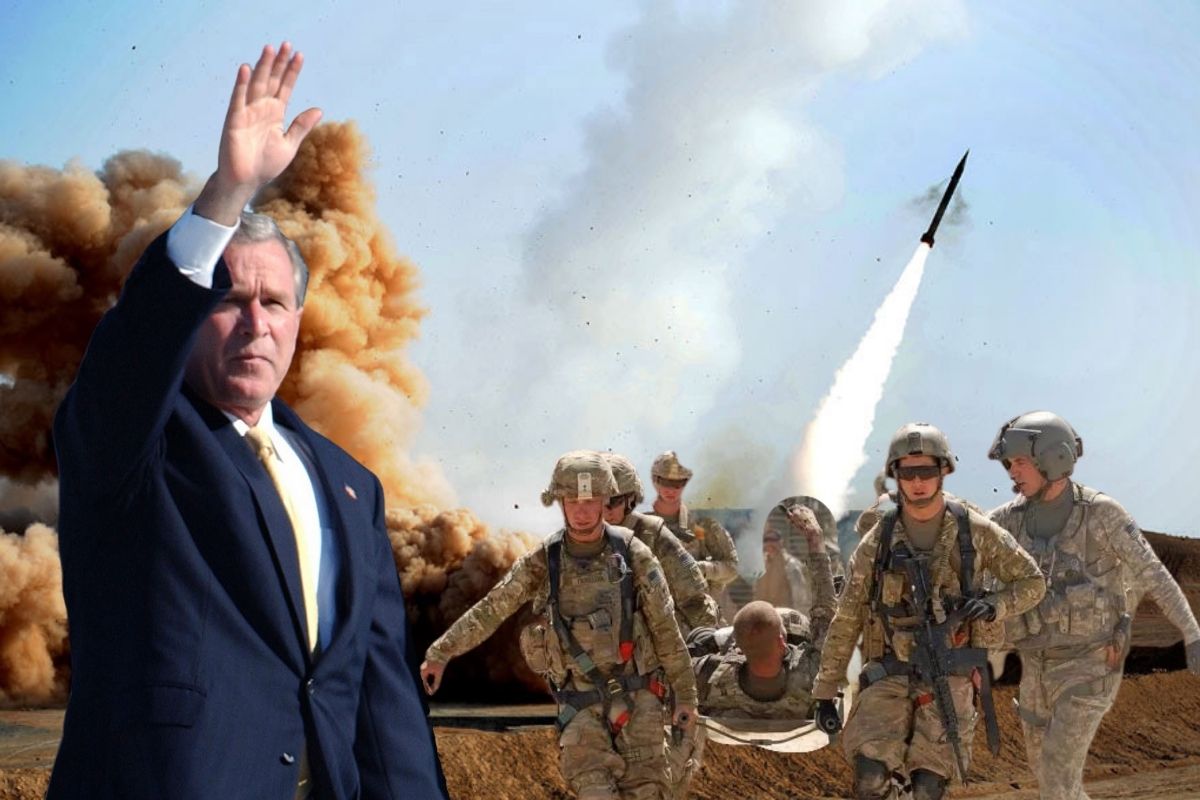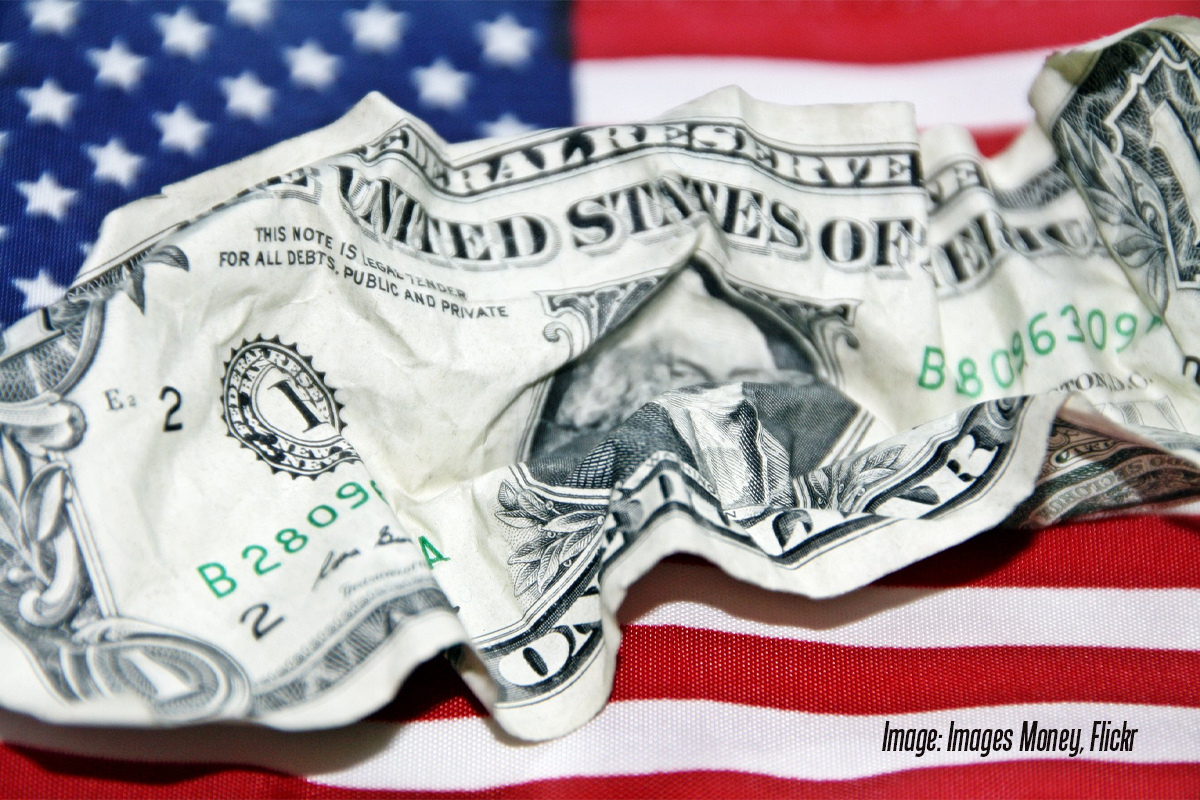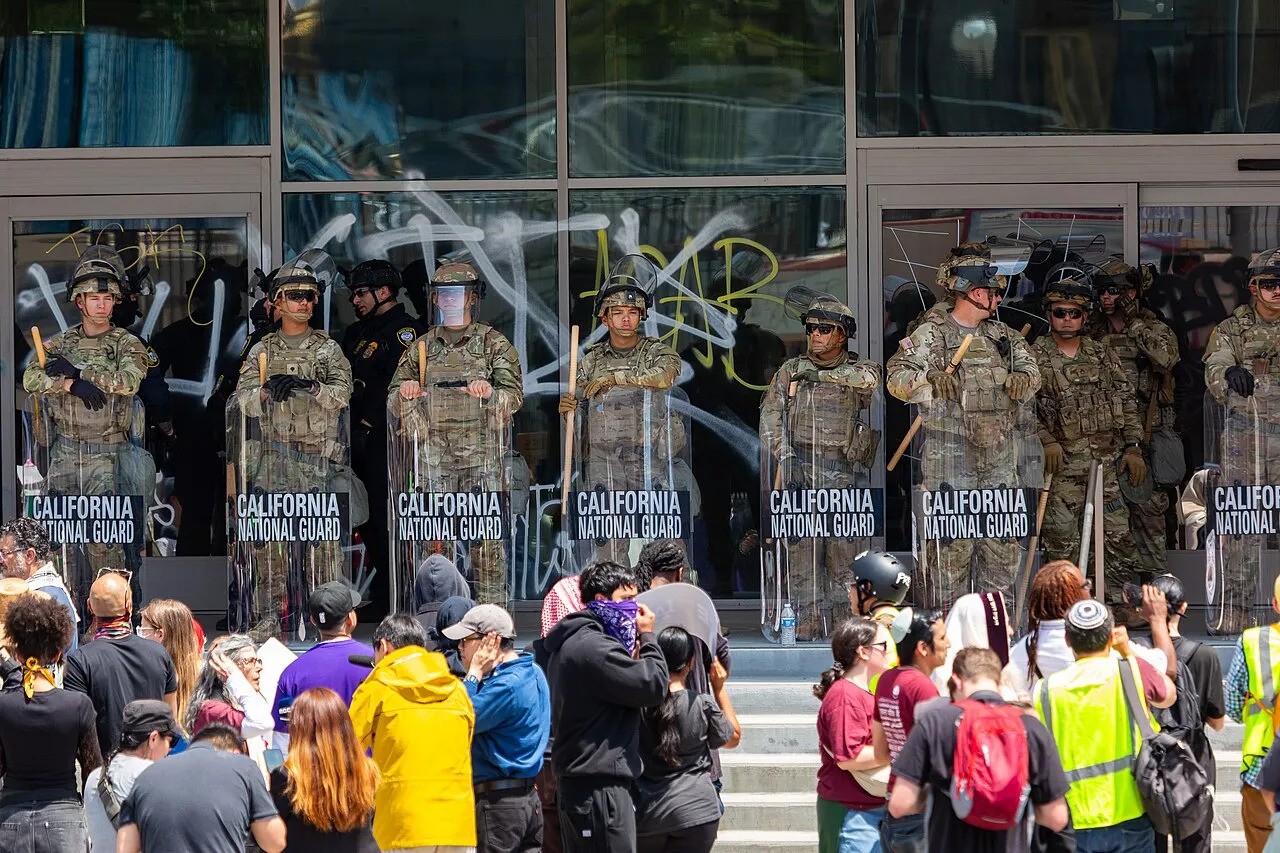On this day 20 years ago, Al Qaeda terrorists shocked the world by bringing down the Twin Towers. Two decades on – after waging a long, bloody war – US imperialism has been humiliated in Afghanistan, opening up a new era of instability.
Twenty years ago today, the United States witnessed the biggest and bloodiest attack on its soil in modern history. At least 2,977 men and women died, and at least 25,000 were injured, after a gang of terrorists crashed a series of commercial aircraft into the Twin Towers of the World Trade Center in New York, leaving the American people in a state of shock and disbelief.
Across the world, millions of people looked on in horror at devastating scenes of desperate people trapped in the upper floors of the towers – some of whom jumped to their deaths rather than face being burnt alive, shortly before the towers collapsed, leaving thousands buried under the rubble.
But what followed this tragedy was a disgrace to the memory of all those innocent people who lost their lives that day. The dust had barely settled, and the blood of the victims had barely dried, before the vultures started circling.
Taking advantage of the mood of national grief, they launched a blitz of lies and war propaganda in order to stampede the US population into accepting the US invasion of Afghanistan, supposedly to avenge the attack.
The Patriot Act and other laws were rushed through Congress, severely curtailing civil rights and dramatically expanding the surveillance powers of the state. All this in the name of a supposed ‘War on Terror’ and the ‘defence of democracy’.
One after another, for days on end, figures like then-President George W Bush, Dick Cheney – and a never-ending stream of other officials, military commanders and ‘pundits’ – appeared on television decrying the attack on ‘freedom’ by the ‘evil forces’ of Islam.
Former Secretary of Education William Bennett and a host of other neocons urged the govenrment to “declare war on militant Islam,” stating that, “the United States should proceed as if in war, because it is war.”
Bennett and his gang called for war on Iraq, Iran, Syria, and Libya, despite the fact that none of these countries had any ties whatsoever with the attack or the reactionary Al Qaeda organisation behind it.
Of the 19 hijackers that carried out the attacks, 15 were citizens of Saudi Arabia. Yet any mention of Saudi Arabia was conspicuously absent from these public declarations. In fact, every effort was made to protect Saudi interests – up to the point of allowing eight chartered planes to safely spirit away high level Saudis from the country, starting on 13 September, despite the fact that American airspace was still under lockdown.
Among those on the flights, was the late Prince Ahmed Salman, who was linked to Al Qaeda, and who was later discovered to have had advance knowledge of a coming attack.
While a racist and frenzied campaign of harassment against people from Middle Eastern backgrounds was being whipped up, these dark figures linked to one of the most reactionary regimes in the world were being given veritable ‘get out of jail free’ cards.
All evidence as to the source of the attacks pointed towards Saudi Arabia, which has long been the world’s foremost sponsor of Islamic fundamentalism. In fact, it was the Saudi monarchy, in collaboration with the CIA, which had originally nurtured Al Qaeda as a part of the Islamist insurgency against the Soviets in Afghanistan in the 1980s.
Now imperialism’s Frankenstein’s monster had escaped control and had become a serious problem for the US and the West. Not a single TV channel made mention of this fact, despite banging the drum about the ‘War on Terror’, day-in and day-out.
The US ruling class was looking to reassert itself around the globe and make an example of some of its enemies. That it had fostered such enemies to begin with was a minor detail.
Hubris
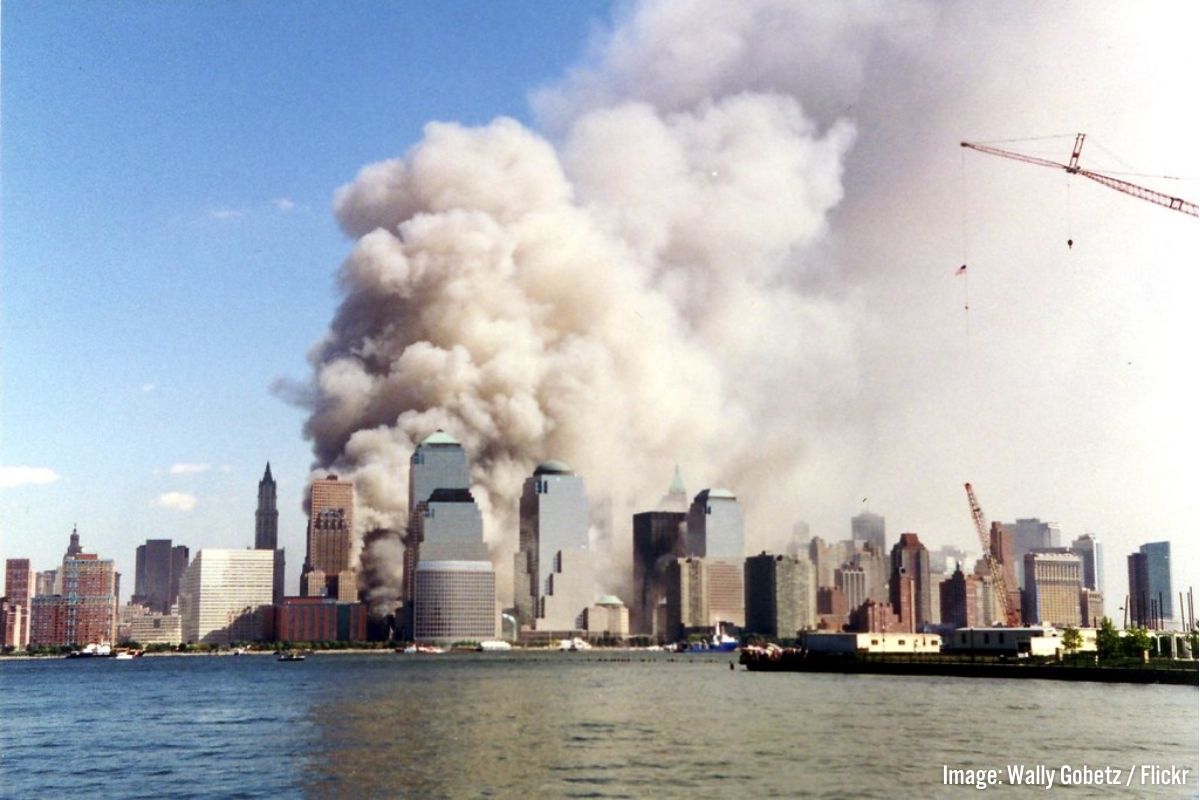
It is often believed by some superficial minds on the left that the ruling class is infallible, and that all of its decisions correspond to some grand plan devised to the last detail in the drawing rooms of power. But that is not at all the case. Mistakes and accidents play a role in history.
Following the collapse of the Soviet Union in the early 1990s, the US emerged as the sole superpower on the world stage. Now it was being shown up by a small gang of reactionary religious fanatics. This was not something it would tolerate.
Appearing on Fox News in the evening of 11 September, an amped-up Colonel David Hunt succinctly expressed this attitude when he told Bill O’Reilly that it was time for the US to “unleash the dogs of war”.
Frothing at the mouth, the dogs at the top of the military establishment were dying to be let loose in order to restore their pride.
With Saudi Arabia – the real source of the attack – being too close to the heart of their interests, the headbangers settled on Afghanistan, imagining it to be an easy target for a brutal display of US imperialism’s vengeance. But as the Bible says, “pride cometh before a fall”.
Once taken, the decision proved fateful. The war on Afghanistan was an adventure which was doomed to fail. On the eve of the fall of Kabul to American troops in November 2001, Alan Woods wrote:
“Yet again, we see how the Americans have thought nothing out to the end. They imagined that once they had pushed the Taliban out of Kabul, the problem would be solved. But this is not at all the case. (…) The Taliban have lost their grip on power, but not their potential for making war. They are very used to fighting a guerrilla war in the mountains. They did it before and can do it again. (…) The prospect opens up of a protracted guerrilla campaign which can go on for years. The first part of the allied war campaign was the easy bit. The second part will not be so easy.
“(…) If the aim of this exercise was to combat terrorism, they will find they have achieved the opposite. Before these events, the imperialists could afford to maintain a relatively safe distance from the convulsions and wars of this part of the world, but now they are completely entangled in it. By their actions since September 11, the USA and Britain have got themselves dragged into a quagmire, from which it will be difficult to extricate themselves.”
How true these words read today. Not content with the results in Afghanistan, Bush, Cheney and their gang – followed by their loyal British lapdogs – decided to double down and open a new front in Iraq, claiming that the latter was harbouring Islamic fundamentalists and weapons of mass destruction.
Of course, these were blatant lies. There was no significant presence of Islamic fundamentalism in Iraq until after the arrival of the imperialists. Neither did the Saddam regime possess any weapons of mass destruction.
The true aim of the war was to access Iraqi oil, increase pressure on the Iranian regime, and push deeper into areas which had previously fallen under the Soviet sphere of influence.
The Amercans thought this would be a swift affair. Again, they miscalculated. By destroying the Iraqi army, which had been used to keep Iran in check for two decades, they not only destabilised Iraq, but the whole region.
On the one hand, the invasion strengthened the Iranians who built a strong base of support amongst the Shia majority in Iraq. On the other hand, it created the basis for the rise of Sunni Islamic fundamentalism, which the US itself leaned on to a certain extent in order to counter Iranian influence, the graphic result of which we saw with the rise of ISIS in 2014.
Nowadays, politicians and so-called experts are queuing up in front of the western media to decry the situation faced by Afghan women following the Taliban’s takeover. These are hypocritical crocodile tears. There is no outcry for the rights of women in Saudi Arabia.
Afghanistan under US occupation was far from the heaven on Earth that it is made out to have been. According to Airwars, US drone strikes since 9/11 have killed at least 22,000 civilians – and perhaps as many as 48,000.
A 2015 report by Physicians For Social Responsibility, estimates the campaigns in Iraq, Afghanistan and Pakistan to have led to 1.3 million deaths! The report concludes that “this is only a conservative estimate. The total number of deaths…could also be in excess of two million, whereas a figure below one million is extremely unlikely.”
In Iraq, the same ‘freedom loving’ people who raised a hue and cry over supposed weapons of mass destruction did not hesitate to use chemical weapons such as white phosphorus in civilian neighbourhoods in Fallujah.
Meanwhile, in both Iraq and Afghanistan, the states set up by the United States were packed with the most corrupt and reactionary gangsters and sectarians.
US imperialism did not bring democracy and human rights to these countries. It brought sectarianism, corruption, death and destruction at unprecedented levels.
The mood turns
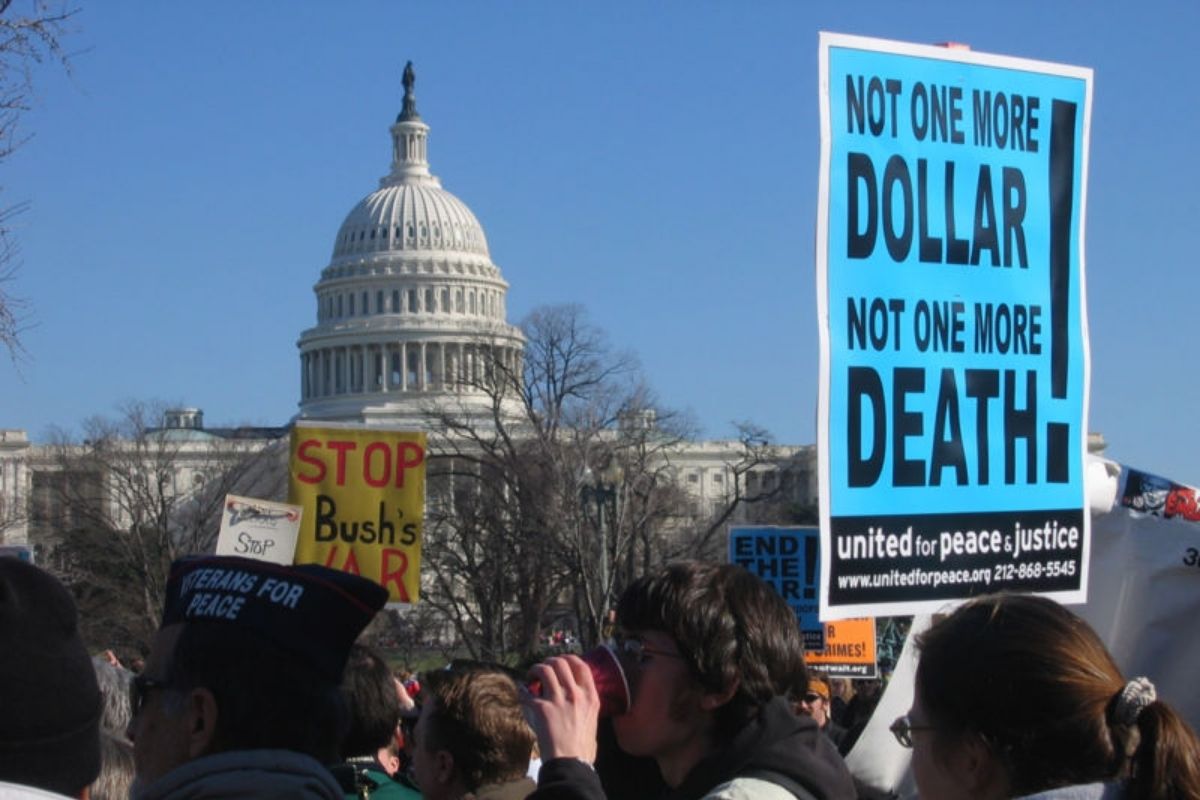
While there were big anti-war protests in the US at the beginning, as a whole, the American masses were initially pushed into accepting the wars after the shock of the 9/11 attacks. Very soon however, this mood changed.
According to Gallup, at its height in 2002, support for the Afghanistan war stood at 93 percent. From here however, the figures only went downhill.
By 2019, after 18 years of fighting at the cost of thousands of American lives and more than a trillion dollars, 6 in 10 Americans said that fighting Afghanistan wasn’t worth it.
American workers today are far more interested in improving their own conditions than footing the bill for never-ending wars abroad. This change in mood has had important political consequences.
In 2012, the Obama administration’s proposal to bomb Syria fell flat on its face after congress refused to support it, with only nine percent of the US population being in favour.
In 2016, when Donald Trump was elected president, one of his most popular campaign promises was to pull the US out of the wars in the Middle East.
The opposition to war severely hampered the ability of US imperialism to manoeuvre in the manner it was used to. Any major military campaign involving ground troops would come at a big political cost for any administration, and as such was ruled out.
Added to this was the economic cost of military interventions. By 2019, the total cost of US interventions in the Middle East was estimated at $6.4 trillion – a further drag on the willingness to embark on new military adventures.
Crisis of imperialism
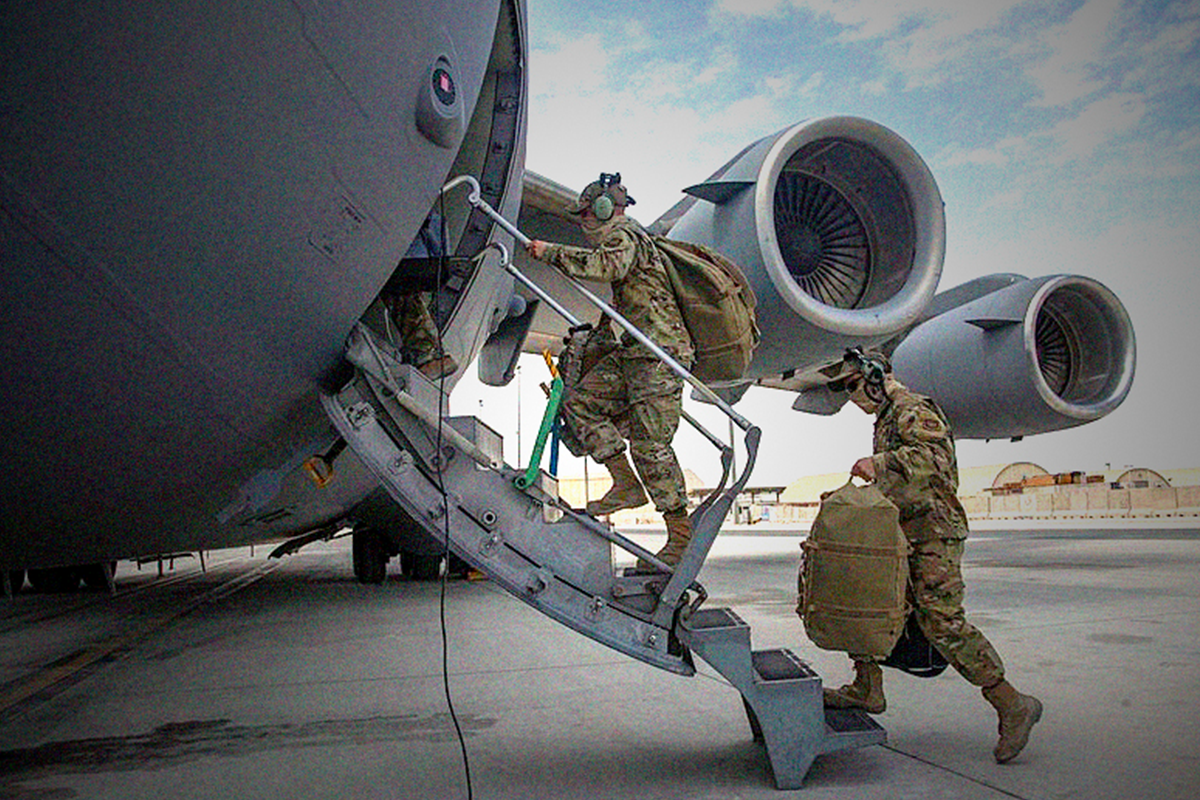
The outcome of the wars in Iraq and Afghanistan was clear from the beginning. But both the Obama and Trump administrations kept postponing the final decision, unwilling as they were to accept the humiliation of defeat. Sooner or later however, something had to give in.
Joe Biden has been rightly criticised for the execution of the withdrawal from Afghanistan in the past month. The rapid advance of the Taliban and the chaotic evacuation of Kabul was a direct result of his incompetence, and that of his colleagues at the top of the army.
But however it was executed, the defeat of the US had been certain for many years. The withdrawal was only the final admission of this fact. This will have important consequences.
Iraq is next in line. Whether through a chaotic withdrawal as in Afghanistan, or as a part of a deal with Iran, the US presence in Iraq on the present basis is untenable. But matters will not stop there.
Seeing the US military machine being ground down by a bunch of Taliban fanatics with Kalashnikovs will embolden other countries to challenge US domination – such as China, Russia, and even weaker regimes such as Iran.
The result is the opposite of what the gung-ho generals were aiming at when they set out to display their might after 9/11.
Rather than a display of US military might, the incompetence, limitations and weaknesses of US imperialism have been put on display for the whole world to see. US allies around the world will now have serious doubts about how much they can rely on Washington for support.
US imperialism is still the most powerful military and economic force on the planet. However, as we have explained, its ability to maneuver has been severely curtailed. As a result, any major US military campaigns are ruled out for now.
Instead, it will be more inclined to resort to economic warfare, limited special operations and proxy campaigns.
Far from making the world a safer place, this will increase instability and tensions in world relations. Like a drunk on the day after a binge, the US ruling class is now forced to reckon with the processes it has set in motion.
Crisis of the US regime
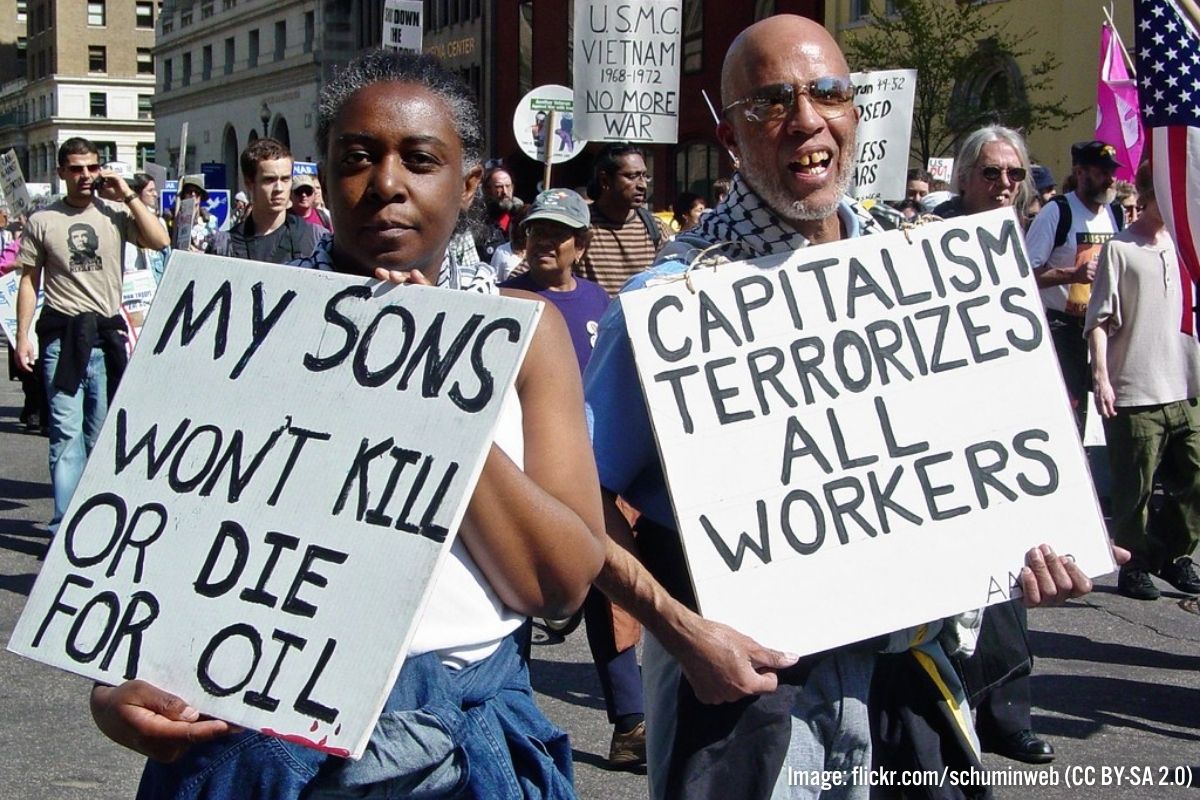
The consequences of these events are not limited to world relations, but also to the relationship between the classes inside the United States.
Almost 800,000 US soldiers participated in the war in Afghanistan. The majority of these returned home with deep physical and mental scars – that is, if they returned home at all.
In an interview with Vice a former marine who fought in some of the toughest battles of Afghanistan gave an interesting glimpse into the mood amongst many within this layer.
When the interviewer asked if he things the war was in vain, he responds:
“Yeah, I do. You know as somebody that bled in that war as all of us have…the guys that didn’t come home…why? Why did they not come home? These are 19-20 year-old kids that never got to come home. Never got to start their lives and we abandoned them. We abandoned those guys. And that’s hurtful.”
The feeling of betrayal runs through every word of this statement. It is not difficult to imagine the anger that must pervade many of those ordinary Americans who supported the wars in Afghanistan and Iraq as they come to realise that they have been deceived.
After twenty years of war, none of the promises made to them have come to fruition. Rather than a safer, more democratic world, the rampage of US imperialism has left behind it a trail of barbarism and misery.
Islamic fundamentalism has not been defeated – rather, with US aid, it has found safe havens that it never had before in Iraq, Syria and Libya. Iraq and Afghanistan are not one step closer to democracy than they were before.
All talk of a ‘new world order’ based on so-called democratic, American values; ‘nation building’; the ‘War on Terror’, and American exceptionalism has been shown to be nothing but hot air.
These are serious problems for the establishment, which is increasingly seen by Americans as an incompetent pack of liars, opportunists, and charlatans.
Speaking on the Net Assessment podcast, Christopher Preble of the conservative Cato institute sounded the alarm:
“We have this pattern of misleading, false or in a few cases outright lies [in the] statements pertaining to the effectiveness of Afghan security forces.
“…The credibility gap was the problem from the Vietnam era of US government officials saying things about the progress of that war, for example about the durability of the government of south Vietnam or the fighting effectiveness of the army of the republic of Vietnam, which turned out not to be true. That was a credibility gap. And thus US officials weren’t trusted to tell the truth.
“…My point is that this credibility problem is not confined to foreign wars. We have a collapse in trust in the institutions of this country right now. And millions of Americans are unable to differentiate fact from fiction… There is a credibility problem and it is getting worse. The American people do not believe government officials.”
These are sobering words of warning coming from one of the more intelligent strategists of US capitalism. While the tragedy on 11 September 2001 – and the subsequent wars in Iraq and Afghanistan – initially strengthened the mood of patriotism and national unity, defeats in those wars have added to the mood of hate and suspicion towards the ruling class.
The crisis of US imperialism abroad is also a crisis of US capitalism at home. Together with factors such as the criminal handling of the COVID-19 pandemic, falling living standards, widespread economic uncertainty, and the scourge of racism, it has fed into the molecular process of revolution that is taking place beneath the surface.
The chickens are coming home to the roost for US imperialism. The conditions are being prepared for the American capitalist class to face punishment for its crimes – not by the Islamist madmen it itself nurtured, but by the revolutionary masses.

